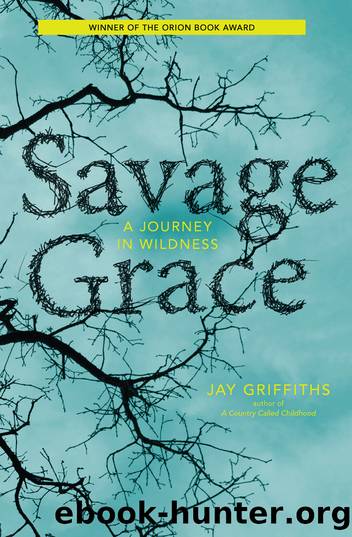Savage Grace by Jay Griffiths

Author:Jay Griffiths
Language: eng
Format: epub
ISBN: 9781619025110
Publisher: Catapult
Published: 2018-04-27T00:00:00+00:00
PARADISO GIOCOSO
Whales are serious about play, in deliberate delphic delight, in a porpoiseful paradise, having a whale of a time. Cetaceans play with feathers and flotsam, twigs and jetsam, turtle-teasing, buoyant and bubble-blowing. Play is at the height of their culture and they make the entire Pacific ring to their paradise tune. âEden saw play,â the hymn says: actually Eden was play for âEdenâ was the Hebrew word for delight.
The ancient Greeks believed that Ocean is where the earth ended and heaven began and the whales knew that too. They had no need to search for paradise in the past or the future or on any islandâdolphins could recognise an Eden when they echolocated one. The geographer Posidonius wrote that the ocean âstretched to infinity.â Whales, who presumably knew that the earth was round a long time before humans ascertained that fact, knew it was finite in area, but infinite in beauty and paradisality. It is also our paradise lost, this place we crawled out of to begin our dry existence on earth, as if Genesis and Darwin were both right, and there is a paradise from which we are now too evolved ever to return.
Or can we? âBack to nature? Farewell to civilization? It is one thing to dream of it and another to do it. I tried it. Tried to return to nature. Crushed my watch between two stones and let my hair and beard grow wild . . . I tried to enter the wilderness empty-handed and barefoot, as a man at one with nature.â Thus Thor Heyerdahl in Fatu-Hiva, on his glorious, youthful attempt to seize paradise like a watermelon in both hands and cram his lovely smiling face full of it.
The idea of wilderness has a complex history. It has negative connotations of chaos; savage, frightening and deadly nature beyond the safety of human walls. But it has also suggested a heaven on earth. âWildernessâ has been seen as both the paradise and the snake. Wilderness has been sited on both sides of the wall.
When wilderness has been associated with paradise, it is often seen not in the present but the pastâa place still existing from the dawn of the world. In a British expedition to Australia in 1801, the naval officer Matthew Flinders took his ship to Kangaroo Island off the southern coast. It was a place, he remarked, where the Golden Age still seemed to endure. Thomas Livingstone Mitchell, a Scot who made four expeditions to New South Wales between 1831 and 1846, writes that the land âlay before me with all its features new and untouched as they fell from the hands of the Creator . . . it was indeed a sort of paradise to me.â
Columbus, who famously confused West with East, was in absolutely no doubt about one thing: he had discovered paradise, he had found âthe original abode of our first parents, the primitive seat of human innocence and bliss, the Garden of Eden.â He stated that the earth
Download
This site does not store any files on its server. We only index and link to content provided by other sites. Please contact the content providers to delete copyright contents if any and email us, we'll remove relevant links or contents immediately.
| Death, Grief & Loss | Epic |
| Family | Inspirational & Religious |
| Japanese & Haiku | LGBT |
| Love Poems | Nature |
| Places |
The Universe of Us by Lang Leav(15067)
The Sun and Her Flowers by Rupi Kaur(14508)
Adultolescence by Gabbie Hanna(8917)
Whiskey Words & a Shovel II by r.h. Sin(8008)
Love Her Wild by Atticus(7749)
Smoke & Mirrors by Michael Faudet(6183)
Wiseguy by Nicholas Pileggi(5769)
The Princess Saves Herself in This One by Amanda Lovelace(4966)
Love & Misadventure by Lang Leav(4842)
Memories by Lang Leav(4795)
Milk and Honey by Rupi Kaur(4739)
Bluets by Maggie Nelson(4546)
Too Much and Not the Mood by Durga Chew-Bose(4337)
Pillow Thoughts by Courtney Peppernell(4271)
Good morning to Goodnight by Eleni Kaur(4231)
The Poetry of Pablo Neruda by Pablo Neruda(4093)
Algedonic by r.h. Sin(4056)
HER II by Pierre Alex Jeanty(3604)
Stuff I've Been Feeling Lately by Alicia Cook(3448)
